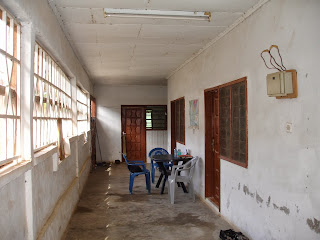My more mature readers may remember a
government campaign many years ago entreating us to take care of our
countryside. Adverts persuaded us to
follow the country code; closing gates, keeping dogs on a lead, taking litter
home. “Don’t drop litter, put it in a
bin,” became a familiar catchphrase.
Overall, the scheme succeeded in drawing public attention to an ugly
problem and, despite the array of fast food wrappers, gum spots and unsightly
fly-tipping, the British town and countryside are reasonably litter free. Not so Ghana!
In some of the larger Ghanaian towns
and cities, household rubbish collection is currently, slowly being introduced
but here in Zebilla no system exists.
The result is streets festooned with the ugly remains of daily life;
fields planted with plastic bags, tired shoes, broken bicycle parts…
To be fair, I haven’t seen any larger
items scattered around – there are no dead fridges, beds and sofas hurled into
the riverbed. Such items are endlessly
restored, repaired, renewed, regenerated and with relative ease. So perhaps in this sense Zebilla is far more
resourceful than the UK. However, the
town would hugely benefit from the introduction of our “bag for life”!
Wherever you shop here, your purchases
are placed in a “rubber” (plastic bag), the most common being of thin black
plastic. Despite insisting on using our
own shopping bag we have amassed a large store of them. Water is sold cheaply and freely in a ½ litre
plastic sachet. The automatic means of
disposal for both of these is to simply throw them on the ground. The Ghanaian mindset is that rubbish is
simply dropped.
Household rubbish is dealt with by
public burning either individually or communally. The tracks and paths throughout the town are
bordered by such burning sites. Once
alight, the rubbish is left to itself to burn or to scatter in the wind. In schools, children are in charge of
sweeping up the rubbish in the school grounds (where the teachers have dropped
their water sachets and food wrappers!) each morning and lighting the
fires. Yes, young children are left to
light the fires unsupervised! School
Health and Safety Officers would have a heart attack. (Don’t come to Ghana,
Heather!).
Compostable waste is much easier – all
you do is chuck it over the fence for the foraging, roaming, domestic
animals. There was one time when we left
a “rubber” of waste by our door and we suspect some passing, foraging, hungry
children had their fill of our tasty (!) scraps.
Public areas are, therefore, in the
main, rather unsightly. However,
individual places are not always so. The
matriarch living opposite is outside every morning by 6.30am sweeping her
“yard” with a backbreaking twig broom. No leaf or rubber is safe on her
patch; no grain of sand is left out of place. Once completed she sits on her wall to admire
her handiwork and survey the littered field beyond. Job done!
An efficient broom but it breaks your back!
We have encountered a couple of very
creative recyclers; one lady who uses the rubbers and sachets to weave baskets
and a farmer who uses the sachets like plant pots for his seedlings. I look forward to meeting many more of these
pioneers – their skills are badly needed.
From such observations I conclude that
Ghana is breeding a large rubbish problem which currently the government seems
unable to solve. It may not be a
priority to return the countryside to its uncluttered beauty but the health and
safety aspects will need to be seriously addressed as the populations in the
towns and cities rise. Developing a
better drainage and rubbish collection system may not be very glamorous but
perhaps some of the leading charities might like to consider lending a hand in
this direction in order to save a life!
























